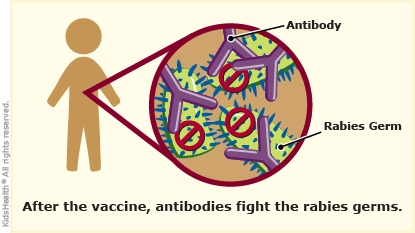After Rabies Shots: How to Care for Your Child
Rabies vaccines (shots) can help keep your child from getting infected with rabies. It is very important that your child receive all the shots that the health care provider recommends.


Rabies is a very rare but serious illness caused by a virus. It can lead to brain damage and death. Rabies shots can help protect a person from getting the disease.
Certain wild animals — especially bats, raccoons, skunks, foxes, and coyotes — can have the rabies virus in their saliva. These animals can bite children or pets and spread the disease. They also can spread the virus if their saliva gets into cuts or scratches or into a person's mouth or eyes.
The Centers for Disease Control and Prevention (CDC) recommends the rabies vaccine for anyone who:
-
was bitten by an animal that has or might have rabies
-
slept in a room that a bat got into
-
is preparing to travel to parts of the world where rabies is common
The number of rabies shots needed differs depending on why they are needed. When health care providers give rabies shots after a bite, more shots are needed and a second type of shot is also needed. When given before travel, fewer shots are needed.
Kids who get the rabies vaccine after contact with an animal usually get four shots. They get the first shot as soon as possible, and get the other shots 3 days, 7 days, and 14 days later. At the same time as the first rabies vaccine, they also get a second shot called human rabies immune globulin (RIG). This shot provides protection right away while the rabies vaccine starts working to protect the body.
Kids who get the rabies vaccine before traveling get three shots over 3 or 4 weeks.
Kids usually get the rabies vaccine in the thigh or shoulder. They usually get the RIG shot around the animal bite and sometimes also in the buttocks muscle.
Some kids have redness, pain, swelling, or soreness in the area where the shots were given. They may also have a low fever, headache, muscle aches, nausea, or dizziness. These side effects aren't as serious as rabies, which is almost always life threatening. Rarely, a child can have an allergic reaction right after the shot or in the hours after leaving the doctor's office.

-
If your child has pain at the injection site or a mild fever, a medication may help:
-
For children under 6 months, you may give acetaminophen.
-
For children over 6 months, you may give acetaminophen OR ibuprofen, if recommended by your health care provider.
-
Do not give any other medicines unless the health care provider says it's OK. Some medicines can prevent rabies vaccine from working well.


Your child:

-
Your child develops numbness, tingling, or weakness in the feet, legs, fingertips, hands, or face within a few months of getting the shot.
Call 911 if your child has any signs of a serious allergic reaction. These can include swelling of the face or mouth, hoarseness, wheezing, trouble breathing, hives, paleness, weakness, dizziness, vomiting, or a fast heartbeat.